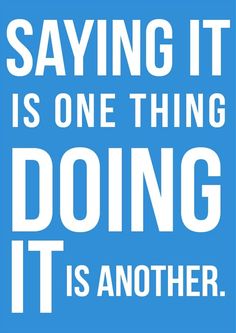
Walking the talk sets you apart from many who advocate this, but are hypocritical and do not.
They do not practice what they preach. It is more of, “Do as I say and not as I do”.
There are other sayings that reflect those who do not walk the talk. They include:
- All hat and no cattle
- Empty suit
- All talk and no action
In all instances they reflect how others want you to act, while doing the exact opposite. I have seen this too many times throughout my life. I especially saw it in business with people who were supposed to be the company’s leaders. It made it difficult for me and others to take what they told us seriously.
We knew that they didn’t mean or believe it. And if they did, they weren’t practicing it.
I had my own variation of this. I repeatedly told my children ‘Don’t tell me what you are going to do, show me’.
To me, talk is cheap and can be twisted. Remember when a famous person once declared, “It depends on what the meaning of is, is”’?
When it comes down to parsing our language that way, it is hard to believe what you are being told.

The earliest usage of the expression, “Walk the Talk” comes from the Mansfield News (https://knowyourphrase.com/talk-the-talk). It was an Ohio newspaper printed in June 1921. The line from the newspaper read:
“Although he has no gilded medals upon his bosom, Howard Herring of the North American Watch Company, walks the walk, and talks the talk, of a hero today.”
In virtually all of the articles on leadership, a good leader is one who demonstrates this virtue to his or her followers. It elicits confidence andtrust in that person and makes them someone you want to emulate and follow. True leaders know that walking the talk sets you apart from pretend or poor leaders. They know that their reputation and control is built on how they are perceived.
When one says one thing and does completely opposite, they will have a poor reputation at best. And they will have no control. Nor can they expect others to be reliable, when they are not. Remember the 20-60-20 rule I wrote about in Laws? Tie to this How are the middle 60% going to act when they see how their leader is behaving? What’s good for the goose is certainly good for the gander.
I firmly believe that everyone should walk the talk.
That allows us to then know that we can count on that person to deliver. It also alerts us to who cannot be counted upon. We can then appropriately deal with each.
Throughout my professional career, I have come across many individuals who either walked the talk or didn’t. I decided early on that I wanted to be on the side that did. I felt that walking the talk sets you apart from the herd and makes you a good, if not great leader. Those that don’t still have a position of authority, but do not have a loyal following. Their subordinates will do what they have to, to keep the boss happy. But their heart is not in it and the results of their efforts show that lack of enthusiasm.
When I was a Project Engineering manager, I had to develop a five year operational plan for my company. It had not been done before. It was to alert the executive committee to potential large capital outlays that would be required to support the company’s Sales and Marketing plans.
This was something I was never taught in school or dealt with in previous jobs. I had no idea where to begin. So, I sought out advice and help from the various operations directors. Each of them told me that they had done this many times before and they would be glad to help.
I set appointments to meet with each of them to gain some of their knowledge. I had meetings with three different directors. The most I learned from these sessions was that they also had no idea how to develop a plan. It was clear after talking to them that clear none of them had ever done this either.
When you have done something as important as developing an Operational Strategic plan you usually keep a copy of your work. In that way, you have a template to follow. And if you are proud of what you have done, you can flash it in front of your audience and impress the heck out of them.
None of that was present in my talks with them. There were no hard examples to view. The talk was generic on the importance of developing a plan. I already knew that as the vice president instilled that in me when he gave me the assignment.
There were no specifics on how to develop the plan.
Things like what to consider, who to talk to, and what details to include were not discussed. One of the directors told me he couldn’t remember all the details of the elaborate plans he had put together. He told me he had saved some plans he had developed and would be happy to share these with me.
After waiting a few weeks and not receiving anything, I asked him when I could see his work. He told me that they were in boxes in his basement at his home. There were many boxes that he couldn’t remember in which box he had stored them. And, he didn’t have the time to go through them. He told me that if I developed a plan draft he would be happy to review it and provide any edits.
What a wonderful gesture! If I knew how to develop a plan I wouldn’t be having a conversation with him on how to develop a plan. I left knowing that he had never done this either and was as clueless as I was. The difference was that I knew I was clueless.
To complete my assignment, I had to figure this out for myself. The internet was not an option for doing research. It was not in wide use in business yet and didn’t have the vast store of knowledge we have today to tap into.
So I read as many journals and periodicals as I could. I went to the library. And I just used common sense.
What would I want to see in a plan?
Through this I was able to cobble together my and the company’s first plan.
I still have a copy of that first plan. And I know where it is kept for whenever I need to reference it. It is not in a box somewhere in my basement. And I have shared that template with others. When I turned over the plan to another person in the corporation, I gave him a copy. I also shared it with other companies who also wanted to develop plans and had never done so. In that way I am living up to the credo that walking the talk sets you apart.
In every consulting experience I have had in my career, I observe the executives I deal with. I am looking to see who is walking the talk.
Then I can gage how successful, the project will be. Sometimes I get fooled, because I form an initial impression of the person or persons I am dealing with. As I get to know them better, that view may change. It has on certain occasions. Then, I get a good read and from it I can adjust how to go about getting the best results I can.
In some cases I ask the executive straight out if he or she is committed to making the changes needed. I never got a “No” as an answer. That comes later when faced with actually making the changes required.

Walking the talk is all about commitment.
If you are committed to improvement, you will be dedicated to doing what it takes. If you are not, then you should admit so and save time, money and aggravation. You are not a believer that walking the talk sets you apart. And there is no wonder that you and your business are having issues that you cannot solve on your own.
The people I have previously written about who had a positive and major impact on my life all walked the talk. Bill Clymer, Wallace Richardson, George Kane, Frank Fornoff, and August Kuebler were men of their word. I have tried to live up to the standards they set. I know they are proud of my efforts to do so. They epitomized that walking the talk sets you apart.
Living to a high standard has some disadvantages.
In certain instances, it may mean you are taking a contrary position to the popular view. In that case you may be ostracized or become unpopular. There is something about a herd mentality that causes that to happen. Some individuals cannot stand different opinions. They resent independent thinking. To me that is a sign of insecurity or weakness.
We need to have different views and perspectives.
To make decisions based on only a single point of view can be dangerous. You may miss important aspects that can keep you from making a major mistake. It takes some time to do this, but it is worth the effort. And it lets those who work with you and for you that you are open minded and value their thoughts and opinions.
But, to some they see this as a danger. I once had a situation as the head of Quality Control where I was butting heads with the Plant Manager. He wanted me to support a decision on whether to release a product with quality questions. I told him the decision was ultimately his and I would go along with his decision. He told me that wasn’t good enough. I had to endorse it as though it was my own. I refused and he was ticked off. I saw it for what it was. He was sure the decision would be questioned and he wanted others such as me to take the blame when it was.
I wasn’t buying it. He worked behind my back to subvert me and my role as head of quality. Because of this I was eventually removed and put in another position in the company. When the truth came out, he was removed as Plant Manager. People came to me and asked if I felt vindicated. I told them, “No. I was mad that it ever came to that”. But, I stuck to my views and that was what was important to me.
It is not easy to walk the talk.
It is written and talked about. But, it is not always practiced. It is one of my core values. I believe that truly walking the talk sets you apart. You may lose some short term battles. But, in the end, you know you are doing the right thing. And the people who you value and matter the most to you will continue to love and support you. That is what really matters.
Really enjoyed this post. Really Great.